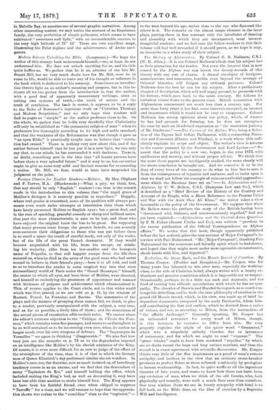The Ifi4ory of Afghanistan. By Colonel G. B. Masson, C.S.I.
(W. H. Allen.)—It is not Colonel Malleson's fault that his subject has so little attraction for the reader. Not even the interest that is now roused by the Afghan war can invest the dreary records of this history with any sort of charm. A dismal catalogue of intrigues, assassinations, and massacres, horrible even beyond the average of Oriental histories, will fatigue any ordinary patience. Colonel Malleson does the best he can for his subject. After a preliminary chapter of description, which will well repay perusal, he proceeds with his history, which goes back to the tenth century, He follows its turbulent course down to the present time. British connection with Afghanistan commenced not much less than a century ago. For more than forty years it has had, some intervals excepted, an interest and importance which it would not be easy to exaggerate. Colonel Malleson has strong opinions about our policy, which, of course, he has had grounds for forming, but he does not strengthen his case by such an ill-advised expression as "the rancorous jealousy of Mr. Gladstone."—The Causes of the Afghan War, being a Selec- tion of the Papers laid before Parliament, with a connecting Narra- tive and Comment (Chatto and Windus), is a work whose title suffi- ciently explains its scope and object. The writer's view is adverse to the course pursued by the Government and Lord Lytton :—" We assert that the policy is a new one, began, in the year 1875, with suddenness and secrecy, and without proper advice. We think that the more these papers are intelligently studied, the more clearly will the above conclusion be brought out. And we conceive it to be the duty of every lover of his country to do what in him lies to save it from the consequences of injustice and rashness, and to insist upon it that we shall not follow the example of ruinous territorial aggrandise- ment which the Russians have set us."—In Afghanistan and the Afghans, by C. W. Bellew, C.S.I. (Sampson Low and Co.), which is described as a "Brief Review of the History of the Country and Account of its People, with a Short Reference to the Present Crisis and War with the Amir Slier Ali Khan," the writer takes a view favourable to the policy of the Government. We suppose that when Mr. Bellew wrote his preface, the story of the British having been "threatened with violence, and unceremoniously repelled," had not yet been exploded.—Afghanistan and the Central-Asian Question, by F. H. Fisher (James Clarke and Co.), was written "previous to the recent publication of the Official Correspondence on Afghan affairs." We notice that this book, though apparently published before the last noticed, gives the true account of Major Cavagnari's in- terview with Faiz Muhammad. "He [Major Cavagnari], thanking Faiz Muhammad for the courteous and friendly spirit which he had shown, and hoped that they might meet under more agreeable circumstances, shook hands with him, and departed."


































 Previous page
Previous page